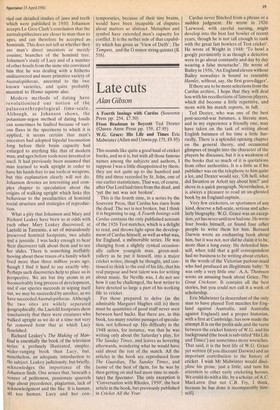Late cuts
Alan Gibson
A Fourth Innings with Cardus (Souvenir Press pp. 254, £7.50) nom Bradman to Boycott Ted Dexter (Queen Anne Press pp. 159, £7.95) W.G. Grace: His Life and Times Eric Midwinter (Allen and Unwin pp.175, £9.95) This sounds like quite a good haul of cricket books, and so it is, but with all those famous names among the subjects and authors, I suppose I was a little disappointed by them: they are not quite up to the hundred and fifty and three recorded by St. John, one of our earlier statisticians, That was, of course, after Our Lord had risen from the dead, and 'yet the net was not broken'.
This is the fourth time, in a series by the Souvenir Press, that Cardus has risen from the dead. The net is not broken, but I think it is beginning to sag. A Fourth Innings with Cardus contains the only published account of the 1926 Test matches, which is a delight to read, and throws light upon the development of Cardus himself, as well as what was, for England, a memorable series. He was changing from a slightly cynical occasionally callow youngish man, green-andyallery as he put it himself, into a major cricket writer, though he thought, and continued to think to the end of his life, that his real purpose and best talent was for writing about music. Sir Neville was, I do not see how it can -be challenged, the best writer to have devoted so large a part of his working life to cricket.
For those prepared to delve (as the admirable Margaret Hughes still is) there must be quantities of good stuff never seen between hard backs. But there are, in this book, too many routine passages of speculation, not followed up. His difficulty in the 1948 series, for instance, was that he was writing only about the Saturday's play, for The Sunday Times, and leaves us hovering afterwards, wondering what he would have said about the rest of the match. All the articles in the book are reproduced from The Guardian, The Sunday Times, and (some of the best of them, for he was by then getting on and had more time to meditate) the Spectator. The only exception is 'Conversation with Rhodes, 1950', the best article in the book, but previously published in Cricket All the Year. Cardus never flinched from a phrase or a sudden judgment. He wrote in 1926: `Larwood, with careful nursing, might develop into the best fast bowler of recent years, though he is not tall enough to rank with the great fast bowlers of Test cricket'.
He wrote of Wright in 1948: To bowl a googly persistently is as though a detective were to go about constantly and day by day wearing a false moustache'. He wrote of Bailey in 1956, 'An England eleven without Bailey nowadays is bound to resemble Hamlet, without, say, the first gravedigger'.
If there are to be more selections from the Cardus archive, I hope that they will deal less with his recollections of famous players, which did become a little repetitive, and more with his match reports, in full.
Ted Dexter, who was one of the best post-second-war batsmen, a literate man, and in my experience a friendly one, may have taken on the task of writing about English batsmen of his time a little hur riedly. There is a splendid opening chapter on the general theory, and occasional glimpses of insight into the character of the players he discusses, but it is a weakness of the books that so much of it is quotations from other authorities, It is a little as if his publisher was on the telephone to him quite a lot, and Dexter would say, 'Oh hell, what did Swanton or Arlott say about him?' and shove in a quick paragraph. Nevertheless, it is always a pleasure to read an un-ghosted book by an England captain.
Very few cricketers, or sportsmen of any kind, deserve a full-scale, serious and scho larly biography. W.G. Grace was an excep tion, yet has never until now had one. He wrote four books himself, or found four other people to write them for him. Bernard Darwin wrote an enchanting book about him, but it was not, nor did he claim it to be, more than a long essay. He defended him self, when told that a golf correspondent had no business to be writing about cricket, in the words of the Victorian parlour-maid who had produced an illegitimate baby: 'it was only a very little one'. A.A. Thomson wrote an amusing book about Grace, The Great Cricketer. It contains all the best stories, but you could not call it a work of scholarship.
Eric Midwinter (a descendant of the only man to have played Test matches for Eng land against Australia, and Australia against England) and a proper historian, with a first at Cambridge, has now made the attempt.It is on the prolix side ,and the turns between the cricket history of W.G. and his background (the book is sub-titled 'His Life and Times') are sometimes more wrenches.
That said, it is the best life of W.G. Grace yet written (if you discount Darwin) and an important contribution to the history of cricket. I wish Mr Midwinter would discipline his prose, just a little, and turn his attention to other early cricketing heroes. We could do with a life, by a scholar, of A .C. MacLaren (but not C.B. Fry, I think, because he has done it incomparably himself).


































 Previous page
Previous page